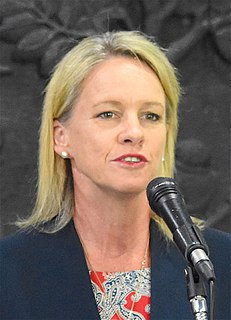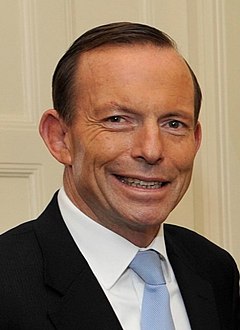
The Senate is the upper house of the bicameral Parliament of Australia, the lower house being the Australian House of Representatives. The composition and powers of the Senate are established in Chapter I of the Constitution of Australia. There are a total of 76 Senators: 12 are elected from each of the six Australian states regardless of population and 2 from each of the two autonomous internal Australian territories. Senators are popularly elected under the single transferable vote system of proportional representation.

The Parliament of Australia is the legislative branch of the government of Australia. It consists of three elements: the Crown, the Senate and the House of Representatives. The combination of two elected chambers, in which the members of the Senate represent the states and territories while the members of the House represent electoral divisions according to population, is modelled on the United States Congress. Through both chambers, however, there is a fused executive, drawn from the Westminster system.
In the Parliament of Australia, a casual vacancy arises when a member of either the Senate or the House of Representatives:

Fiona Joy Nash is a former Australian politician. She represented the National Party of Australia in the Australian Senate for the state of New South Wales from 1 July 2005 and served as the Deputy Leader of the Nationals in the Parliament of Australia from 11 February 2016, having previously served as the party's deputy Senate leader since 2008.

Robert John Day is an Australian former politician and businessman who was a Senator for South Australia from 1 July 2014 to 1 November 2016. He is a former federal chairman of the Family First Party. Before entering politics, he worked in the housing industry, owning several businesses, and at one stage serving as president of the Housing Industry Association.
David Arthur Gillespie is an Australian politician and gastroenterologist. He has been a Nationals member of the House of Representatives since 2013, representing the Division of Lyne in New South Wales. Gillespie has served as the Assistant Minister for Children and Families since December 2017 in the Second Turnbull Ministry. He has previously served as the Assistant Minister for Rural Health between July 2016 and January 2017, and as the Assistant Minister for Health between January and December 2017.
Section 46 of the Constitution of Australia provides that if a Senator or member of the House of Representatives is constitutionally ineligible or disqualified from holding that position, they will be liable to pay any person who sues for it 100 pounds for every day that they have sat. With the introduction of the Australian dollar on 14 February 1966, where 100 pounds equaled A$200.

This is a list of members of the Australian Senate following the 2016 Australian federal election held on 2 July 2016. The election was held as a consequence of a double dissolution in which both houses of parliament were dissolved. Ordinarily, only half of the senators terms end at each election. In this case, all 76 senators were elected. At the first sitting following the election, half of the senators representing each of the six states of Australia were allocated six-year terms to end on 30 June 2022, with the remainder allocated three-year terms to end on 30 June 2019. The terms of senators from the Australian Capital Territory and the Northern Territory end on the day of the next federal election.</ref>

The 2016 Australian federal election in the Senate was part of a double dissolution election held on Saturday 2 July to elect all 226 members of the 45th Parliament of Australia, after an extended eight-week official campaign period. It was the first double dissolution election since the 1987 election and the first under a new voting system for the Senate that replaced group voting tickets with optional preferential voting.
Rodney Norman Culleton is an Australian politician who was sworn in and sat as a Senator for Western Australia following the 2016 federal election. At that time he was a member of the Pauline Hanson's One Nation party, but on 18 December 2016 he resigned from the party to sit as an independent.

Re Culleton was a significant Australian court case, decided in the High Court of Australia sitting as the Court of Disputed Returns on 3 February 2017. The case was an influential decision concerning the construction of Section 44(ii) of the Constitution, which held that Rod Culleton's conviction for larceny meant that he was incapable of being chosen as a Senator and the subsequent annulment of that conviction did not operate retroactively to deny the legal effect to the conviction from the time that it was recorded.

The 45th Parliament of Australia was a meeting of the legislative branch of the Australian federal government, composed of the Australian Senate and the Australian House of Representatives. It met in Canberra from 30 August 2016 to 4 April 2019. The 2016 general election held on 2 July gave the Coalition of the Liberal and National Parties control of the House, albeit with a slimmer majority than the 44th Parliament, allowing their leader Malcolm Turnbull to stay in office as the 29th Prime Minister of Australia. During the term of the parliament, the government slipped into minority due to defections and by-elections. The leadership of the government also changed during the parliament, when Scott Morrison replaced Turnbull as Liberal leader and Prime Minister in August 2018. The 45th Parliament was officially dissolved by the Governor-General Sir Peter Cosgrove at 8:29AM on 11 April 2019.

In 2017, the eligibility of several members of the Parliament of Australia to be elected was questioned. Referred by some as a "constitutional crisis", fifteen sitting politicians were ruled ineligible by the High Court of Australia or resigned pre-emptively. The situation arose from section 44(i) of the Australian Constitution, which prohibits parliamentarians from having allegiance to a foreign power, especially citizenship. On that basis, the High Court previously held that dual citizens are ineligible for election unless they have taken "reasonable steps" to renounce the foreign citizenship before nomination.

Alley v Gillespie, was a significant decision of the High Court of Australia that considered the purpose and scope of s 46 of the Australian Constitution. It was the first application brought under the Common Informers Act 1975 (Cth).
Hollie Hughes is an Australian politician who was elected as a Senator for New South Wales at the 2019 federal election. She is a member of the Liberal Party.











